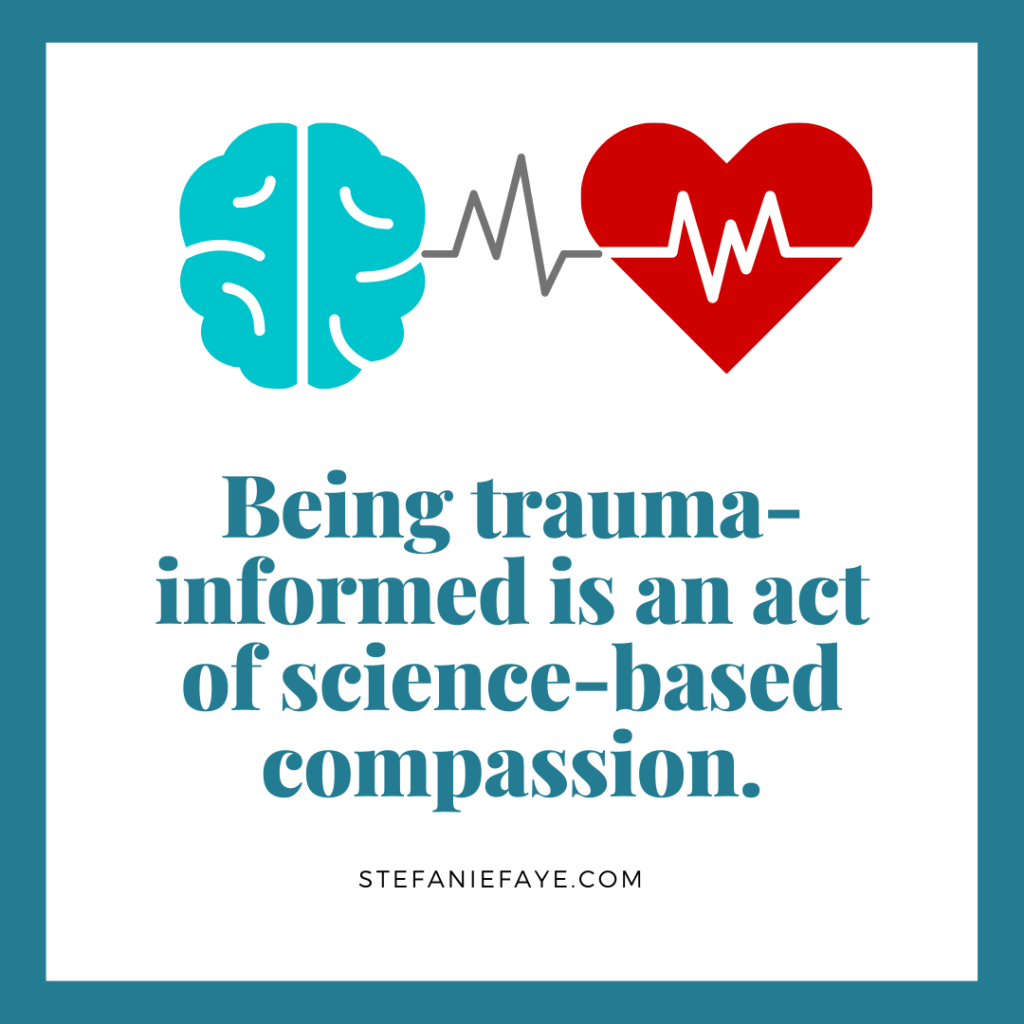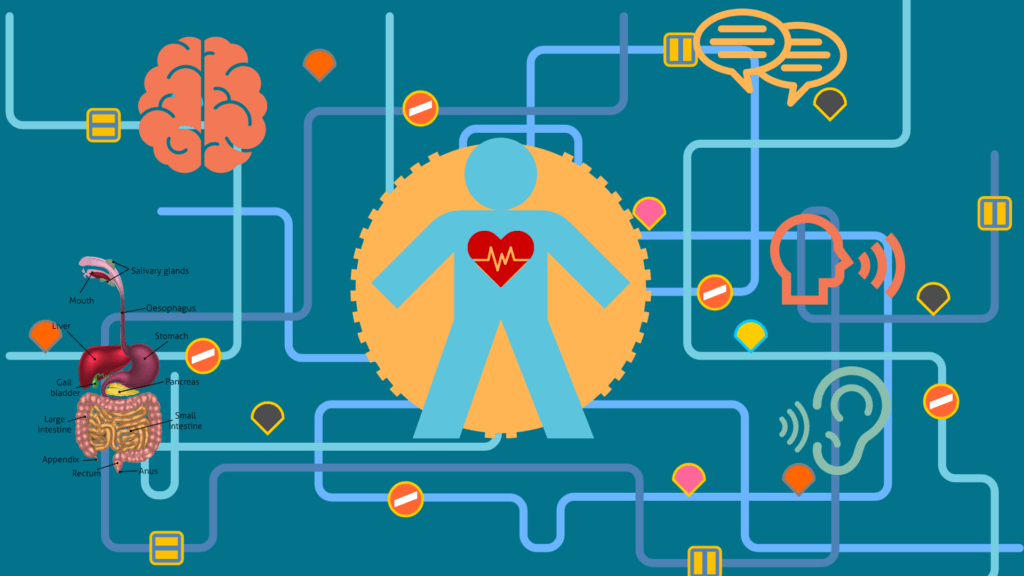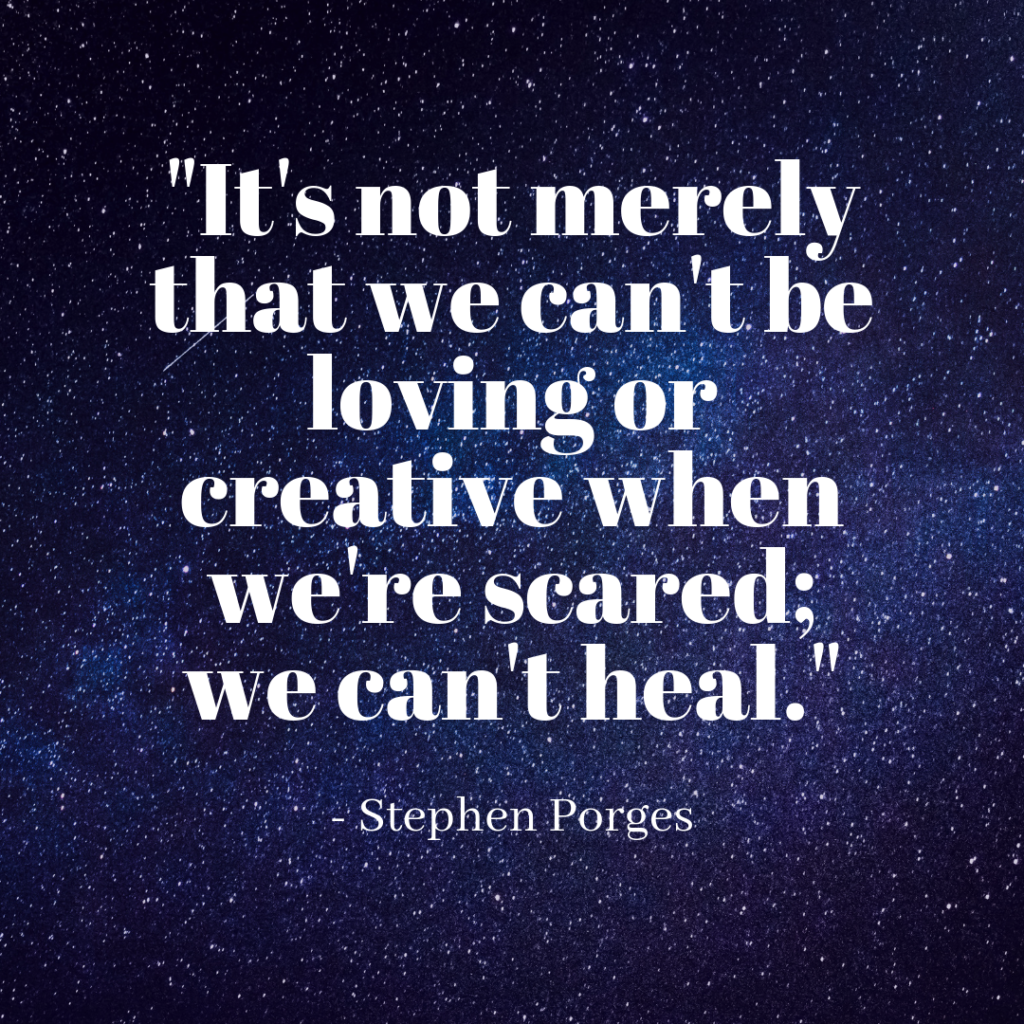
Being trauma-informed is an act of science-based compassion.
We need to discover and share tools and techniques and resources can help someone become more regulated after being dysregulated. That's part of the formula of how a person can move from helplessness and hopelessness to a sense of agency and personal power.
The ability to move from dysregulation into a more regulated state is what will help a person access their problem-solving abilities which improves their long-term trajectory overall. That's why I am such a proponent proponent of self-regulation skills and teachings.
But a deeper question that I find is often not asked is...
Why are we - as humans in general - so anxious, stressed and dysregulated in the first place?
Many of us are exploring that question - often this leads us to think about how many of our reactions and internal states are triggered by events and experiences from our past. A huge part of my material is focused on that, and it's a critical piece to the puzzle.
But there is a deeper level than our familial past.
What is still left to explore is... why are families as dysregulated as they are? And how are systems that are in place right now playing a role in the family and community experience and perpetuation of dysregulated internal states and social behaviors?
The root of this question is tied to:
- a deeper and wider understanding of collective trauma
- the effects of hierarchical structures in society and how this has played a role on in aspects of human behavior
- a collective sense of hopelessness or lack of mobility (which is tied to a dominance/submission dynamic that I'll go into in an upcoming post)
- exposure to violence that every human -whether directly or indirectly - has been exposed to throughout their lifetime or ancestral timeline
And this is why we must become 'trauma-informed' citizens
In his book My Grandmother's Hands, Resmaa Menakem illuminates not only the concept of racialized trauma, but also the effects of violence and post traumatic stress response that lives in the bodies of public safety personnel such as military and police, as well as the history of oppression and violence that is occurred throughout the ages – including for example the Middle Ages.
He writes, "oppression, enslavement, and fear of the the other are as old, and as widespread, as human civilization." -
The reason this is important is because we need to acknowledge how far back our violent history goes.
Why does this matter? Because the neurological effects of trauma and violence affect the socio-biological signals that we project and detect with each other.
These trauma-influenced socio-biological signals feed into to an inter-generational transmission of a collective posttraumatic stress response.

Menakem also talks about two different kinds of pain:
Violations to our psychological and physical safety have a lasting impact on our nervous system.
These neurological abuses affect our nervous system in ways that physically appear as signals that we unconsciously project to others. They also damage our sensory receptors in ways that distort how we receive the signals others send to us.
These signals appear in our voices, eyes, face and hands as microscopic movements that can unconsciously perpetuate a traumatic and tragic past for ourselves and others.
Acknowledging the long and collective history of violence and violations of psychological safety as part of the human psyche can help us understand the signals of pain more clearly.
This is how we begin to build a more reliable sense of psychological safety with each other.
The more we can understand this and how universal it is within the human species, the more we can have an understanding of how our families, social structures, ancestral histories and collective mindsets play a role in what is happening in society now in terms of tribalism, division, violence, abuse, rage and hatred.
There is a trend, especially on social media, to emphasize and almost 'show off' the positive side of things, such as the concepts of resilience and growth mindset and mindfulness.
While these are important because they give us an ideal to look towards, they do not integrate the longer chain of events and patterns throughout history that have contributed to the current state of regulation or dysregulation.
It doesn’t make focusing on those concepts wrong, it only reveals that those perspectives are incomplete.
What is better for our brain's problem-solving algorithms is to illuminate patterns and 'lengthen the time horizon' so that as much data as possible enters our frameworks and perspectives.
Talking about heroes and examples of people overcoming obstacles is crucial to ignite a sense of hope within us. But focusing on this to the neglect or suppression of what's 'not ok' can also distract us from questioning the systems that are perpetuating conditions that make it so much harder to thrive for a majority of people.

Many systems - throughout our history and today - are set up in ways that benefit the people in the highest ranks of that structure.
Hierarchies are naturally-occurring features of systems and are not good or bad. In fact, hierarchies are designed to help the entire system.
However, when the highest levels of the hierarchy do not serve the optimal functioning of the subsystems (lower levels), this is known as sub-optimization* (I'll be covering this Episode 9 of Season 2).
In those systems, if the dominant members are benefiting, there will be little incentive to change the overall structure or operating system. Because change is ‘expensive’ both on a societal level and on a neural and behavioral level within the human brain body system, it can seem easier and more tempting for a leader or higher ranking member to favor to keep things as they are. To do this, they will put their attention not on changing the structure, but how to help the lower-ranking members 'make the most' of it so that the hierarchy stays the same.
Here's the thing though... we are now in an era where we are more aware that the way things have been may not be conducive for us to attain and sustain emotional and neurophysiological states that promote optimal human functioning and adaptability.
We therefore need a more inclusive perspective.
One that includes the positive mindset of resilience and the tools and techniques that help us create the desired internal state no matter what the conditions are. (Because by achieving that level of unconditional power over our neural and behavioral resources, we are able to do more with less and overcome our past circumstances). \
But we also need to include the dark side of our past and the perspective that “ things need to change.” We now have fewer excuses for not knowing what conditions allow humans to thrive and flourish because we can observe it on a physiological and measurable level. Because of this, more of us are understanding that the systems and structures we find ourselves in need to change.
To innovate our way into a more desired experience for all of us, we need to burst out of the old frameworks that continuously repeat themselves throughout history.
The answer for doing that does not lie only in making the most of and accepting how things are.
We can make make peace with, accept and optimize ourselves within a circumstance - but this doesn’t necessarily mean we need to accept circumstances as they are. We are allowed - in fact we are designed - to want change, to have preferences, and to find ways to make those preferences a reality.
By illuminating the parts of us and our history that we have tried to hide or suppress, we open new conversations about how to create those desired experiences and pursue our preferences.

The more we understand how human history has impacted the signals we transmit and receive from each other...
References and further reading:
My Grandmother's Hands by Resmaa Maneken
Thinking in Systems by Donella Meadows
Behave: the biology of humans and their best and worst by Robert Sapolsky
Teaching to Transgress by bell hooks
The Body Keeps the Score by Bessel Van der Kolk
Caste: the origins of our discontent by Isabel Wilkerson


